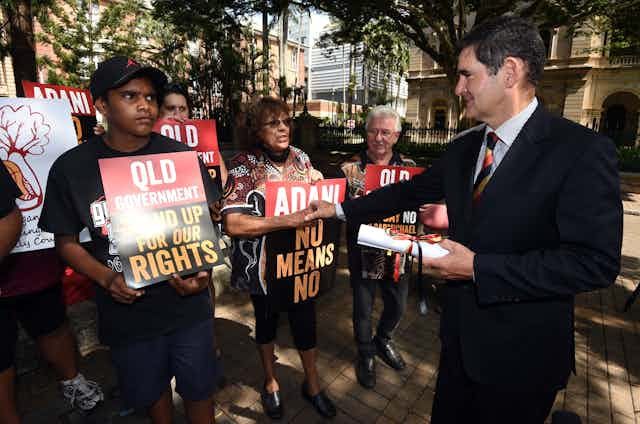Can Australia achieve fair and open decision-making when big coal players are involved? The case of Adani’s proposed Carmichael coal mine suggests the answer is no, and Indigenous land owners are bearing the brunt.
The Queensland government’s recent decision to declare the mine “critical infrastructure” grants the Queensland Coordinator General extraordinary powers to progress the development.
Yet the highly contentious mine continues to face criticism for its environmental impacts, as well as financial woes, as well as active resistance from traditional land owners in the region, represented by the Wangan and Jagalingou Traditional Owners council.
Carmichael in court
The mine has now faced several court challenges, including lawsuits on the basis of groundwater and biodiversity, climate change (including the burning of coal and its impacts for global warming and the Great Barrier Reef), and questions over whether it is economically viable and in the public interest.
While the decisions have generally fallen in favour of the mine, they have provided a platform for experts to expose the project’s impacts and the current limitations of environmental laws. They have also secured additional environmental conditions for the project’s approval.
The Carmichael mine is also a battleground for human rights concerns and specifically the rights of Indigenous peoples. The Wangan and Jagalingou Traditional Owners council are engaged in several legal cases that could impact on the licensing of the project, leading to further delays, investment risk, and leases and agreements being overturned.
Wangan and Jagalingou council say the mine will “tear the heart out” of their ancestral lands, which is why they remain resolute in saying no to a land deal with Adani and the atate. These challenges sit outside the current powers of the Coordinator General and are at the intersection of Australia’s native title system and the rights of Indigenous peoples under international law and conventions.
For Indigenous communities, the mine’s Indigenous Participation Plan would deliver the equivalent of a paltry A$5,000 for each person living in the region each year, a scenario described by one traditional owner as “not a future for Aboriginal people, it’s a scam”.
Sidelining dissenting voices
Besides championing coal, state and federal ministers have repeatedly called for significant winding back of environmental (and other) laws that regulate mining, thereby closing down options to oppose the coal industry’s expansion.
Eroding the rights of activists and watering down laws is part and parcel of the approaches to marginalise dissenting voices, and thereby eroding democracy.
These approaches include expediting court processes to constrain landholders’ rights to object to proposed mines, and reducing the scope and legitimacy of environmental and social impact assessments.
Meanwhile, those who challenge the growth of Australia’s coal industry - including environmentalists, Indigenous rights activists, progressive philanthropists and lawyers - are labelled “irresponsible” and economic saboteurs.
Recent news that environmental groups have received funding from donors in the United States are being used to misrepresent opposition to Australia’s coal industry as driven by foreign interests.
Yet what the array of environmental and Indigenous legal cases against Adani powerfully demonstrate is the tireless commitment of (often volunteer) local, regional, and in some cases national, organisations and groups, as well as public interest lawyers, seeking to engage in democratic legal processes to shore up sound decision making, as well as the future for the regions in which many of these activists live.
In response, Prime Minister Malcolm Turnbull has indicated he may revisit laws to prevent environmental groups taking projects like the Carmichael mine to court, harking back to a debate started by Attorney-General George Brandis last year.
The Indigenous rights agenda
In the case of the Wangan and Jagalingou Traditional Owners council, this campaigning occurs despite severe disadvantages (as documented during a recent visit by the UN Special Rapporteur), including severe pressure from mining companies.
It is also curious to note that amid the flurry of recent media coverage of anti-coal activism, Indigenous opposition to the Carmichael mine has been largely whited out of the story, except where traditional owners are insulted as simply bit players under the influence of the environmental movement.
This is despite the sustained opposition to the mine from the Wangan and Jagalingou Traditional Owners’, who have said no to Adani three times. By ignoring them, government and media fail to acknowledge the Indigenous rights-based challenge to the Carmichael mine, and the campaign which could unravel the thin veneer of native title on which the state relies to sanction the project.
By saying no to Adani, Wangan and Jagalingou council are leaders in the global climate change and human rights movement. They are at the forefront in carving out a path that challenges Australia to meet its international responsibilities.
It remains to be seen whether Australia has the vision and courage to commit to a human rights agenda in grappling with the challenges of climate change and energy transition. Respecting Traditional Owners’ right to say “no deal” to Adani would be a great start.

